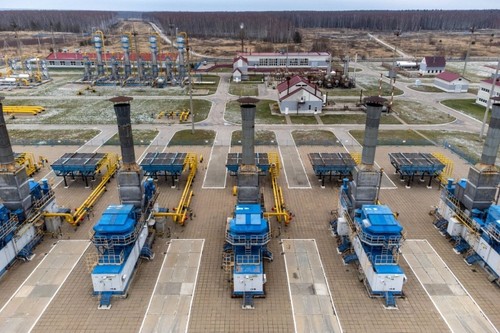 Russia's underground fuel reservoir in Kasimov (photo: AP) Russia's underground fuel reservoir in Kasimov (photo: AP) |
Analysts say Russia’s “special military operation” in Ukraine and the West’s sanctions on Russia in response may not portend another global recession, since Russia and Ukraine together account for less than 2% of the world’s gross domestic product. But because of their important roles in the global supply chain, particularly for fuel and food, their conflict will have a serious impact on the global economy.
Serious impacts
Russia produces 10% of the world’s crude oil and supplies 40% of Europe’s fuel. Russia is the world’s leading exporter of fertilizer, a leading producer of nickel and palladium, the third largest exporter of steel and coal, and the fifth largest exporter of wood. Russia and Ukraine together account for about 29% of global wheat exports and 19% of global corn exports.
The EC says the fighting in Ukraine makes the EU’s projected growth rate of 4% uncertain. Philip Lane, chief economist at the European Central Bank (ECB), says the crisis could reduce the Eurozone's economic output 0.3-0.4% this year. The price of wheat in Chicago, USA, has risen to the highest level since 2008, and corn prices have climbed to their highest level since last May.
The conflict pushed crude oil prices in the global market to 140 USD/barrel on March 7, the highest level in the last decade. Fuel price hikes will boost the price of almost every commodity.
Economists with Capital Economics say Eurozone inflation is very likely to rise above 6% in the coming months. It then looks set to remain well above the ECB’s target of 2% for a long time, most likely ending the year around 4%.”
Tom Rafferty, Regional Director for Asia at the Economist Intelligence Unit, warns that the immediate consequence of the Russia-Ukraine crisis is economic upheaval affecting Asia’s growth prospect. Claudio Borio, head of the Monetary and Economic Department of the Bank for International Settlements, BIS, says tensions between Russia and Ukraine have caused economic instability which will impact other markets besides Europe and Asia. Adam Slater at Oxford Economics forecasts that global GDP will shrink 0.2% this year.
Conflict should end for economic recovery
The Russia-Ukraine crisis is negatively impacting the global economy and no economy is an exception. Economists agree that it’s too early to make an accurate forecast of total losses, but the longer the crisis continues, the worse will be its consequences. Any reduction in the supply of essential goods, particularly fuel and food, threatens the fragile economic recovery gained in recent months.
Some analysts even fear the risk of a food crisis in some regions of the world if the conflict goes on much longer.